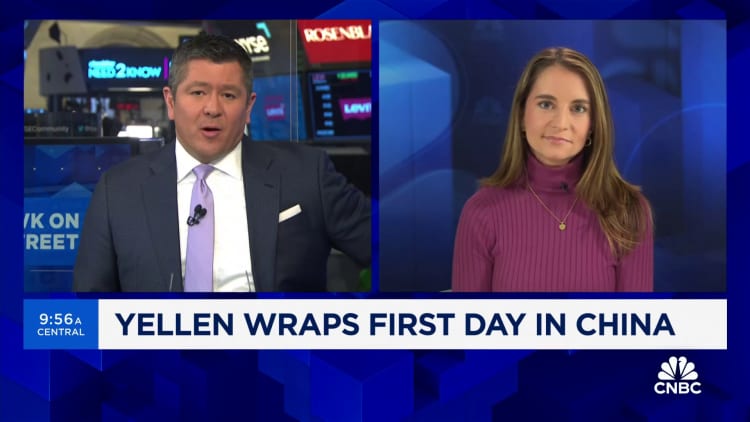
Newly launched BYD Seal is displayed during the launch of the Chinese-made BYD brand in Jakarta, on January 18, 2024, and at the same time introduced 2 other types of battery-powered vehicles (EV, electric vehicle) that will be sold in Indonesia, with an investment of 1.3 billion US dollars. (Photo by BAY ISMOYO / AFP) (Photo by BAY ISMOYO/AFP via Getty Images)
Bay Ismoyo | Afp | Getty Images
China’s Minister of Commerce Wang Wentao said that the speedy rise of the country’s electric vehicle firms was not because of subsidies, but due to “constant innovations.”
The allegations about “overcapacity” by the U.S. and Europe are without merit, he said, China’s ministry of commerce reported Monday. Wang also attributed China’s EV edge to “well-established supply chain system and market competition.”
Wang made the remarks during a roundtable discussion in Paris on Sunday with representatives from more than 10 Chinese companies including EV makers Geely and BYD as well as EV battery manufacturer CATL, a statement from the commerce ministry showed.
The roundtable discussion centered around EU’s anti-subsidy probe into electric vehicle imports from China, among other topics, according to the statement.
Wang noted that the Chinese EV industry has “made an important contribution to the global response to climate change as well as green and low-carbon transformation.” He also said the Chinese government will protect the “legitimate rights and interests” of Chinese firms.
The EU launched an investigation in October to determine if it should impose tariffs on imports of battery EVs from China “to offset state subsidies, and to level the playing field,” following a substantial increase in in imports.
The European Commission President Ursula von der Leyen said in September that the “global market is flooded with cheaper electric vehicles” and that prices are “kept artificially low” because of “huge state subsidies.”
U.S. Treasury Secretary Janet Yellen on Saturday said she was “particularly concerned” about the impact of Chinese industrial overcapacity on the U.S. economy.
Yellen is currently in China for meetings on matters including managing the bilateral economic relationship between the U.S. and China and to advance American interests.
Washington and Beijing will hold “intensive exchanges” that will “facilitate a discussion around macroeconomic imbalances, including their connection to overcapacity,” Yellen said Saturday following a meeting with Chinese Vice Premier He Lifeng.
“I intend to use this opportunity to advocate for a level playing field for American workers and firms,” she said, adding that “a shift away from policies that drive overcapacity would benefit the American, Chinese, and global economies.”